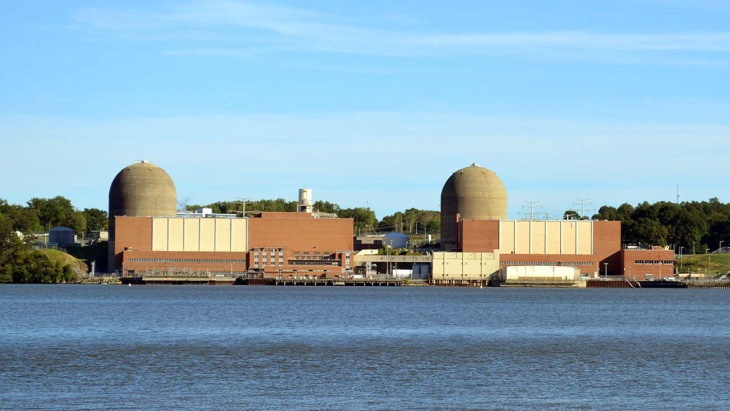Indian Point celebrates record run as closure approaches
Entergy Corporation's Indian Point unit 3 will be shut down on 30 April after nearly 60 years of nuclear power generation at the site in New York state. The closure will bring to an end a world record-breaking run for the pressurised water reactor (PWR).

Indian Point (Image: Entergy)
Entergy announced in 2017 that it would shut down both operating PWRs at the Indian Point Energy Center, citing factors that include sustained low current and projected wholesale energy prices that have reduced revenues. Unit 2 was shut down as scheduled on 30 April 2020.
"Indian Point has been operated and maintained at the highest levels of reliability, safety and security for many years, and unit 3 has been online continuously since April 9, 2019 - setting a new world record for continuous days of operation," Entergy Chief Nuclear Officer Chris Bakken said. "Indian Point's enduring legacy will be the thousands of men and women who operated the plant safely, reliably, and securely, while helping to power New York City and the lower Hudson Valley for nearly 60 years. We owe those who serve now, along with those who came before them, a debt of gratitude."
Unit 3's final uninterrupted operating run of 751 days since its last refuelling, in April 2019, is a new world record for commercial light water reactors. The 1041 MWe unit earlier this month passed the previous record of 739 continuous days set in 2006 by Exelon's LaSalle unit 1.
Light water reactors - PWRs and boiling water reactors - account for the majority of commercial nuclear reactors in operation around the world today. Light water reactors must be taken offline for refuelling. The current world record for a nuclear reactor of any type is 1106 consecutive days of continuous operation and is held by Canada's Darlington unit 1, a Candu reactor which can be refuelled without being shut down.
Indian Point units 2 and 3 entered commercial operation in 1974 and 1976, respectively. Entergy purchased unit 3 in 2000 from the New York Power Authority, and unit 2, as well as the shut-down unit 1, in 2001 from Consolidated Edison. Unit 1 - a 257 MWe (net) PWR - operated between 1962 and 1974.
In the 20 years under Entergy's ownership, combined gross generation from units 2 and 3 averaged around 17 million MWh per year - up from 10 million MWh per year previously. Entergy described the plant as a "workhorse" for the southeastern New York electrical grid, generating some 25% of the power consumed annually in New York City and the lower Hudson Valley.
New York State in 2016 adopted legislation explicitly recognising the zero-carbon contribution of nuclear power plants and protecting the continued operation of the Nine Mile Point, RE Ginna and James A Fitzpatrick plants, which are located in the "upstate" region. The state had, however, opposed Entergy's application to renew Indian Point's operating licences and the plant, which is located 24 miles (39 kilometres) from New York City, was not included in the legislation.
Entergy in April 2019 agreed to sell the Indian Point Energy Center to Holtec International for expedited decommissioning and dismantling of the plant after the closure of the last operating unit. Holtec plans to begin decommissioning promptly following regulatory approval and the closure of the transaction, and it expects to release portions of the site for re-use by the mid-2030s, which Entergy said is nearly 40 years sooner than if it had continued to own the facility.
Entergy has previously pledged not to reduce staff numbers at Indian Point until after unit 3 has been permanently shut and defuelled, and under the terms of the sale agreement with Holtec International, the new owner of the plant post-shutdown will hire more than 300 current Entergy employees for the first phase of decommissioning. About 170 employees at Indian Point plan to relocate or have already relocated to continue working with Entergy, the company said.
Researched and written by World Nuclear News
- China Institute of Atomic Energy
- Nuclear Power Institute of China
- Southwestern Institute of Physics
- China Nuclear Power Operation Technology Corporation, Ltd.
- China Nuclear Power Engineering Co., Ltd.
- China Institute for Radiation Protection
- Beijing Research Institute of Uranium Geology (BRIUG)
- China Institute of Nuclear Industry Strategy (CINIS)
- China Nuclear Mining Science and Technology Corporation


